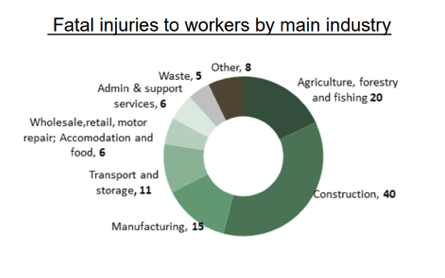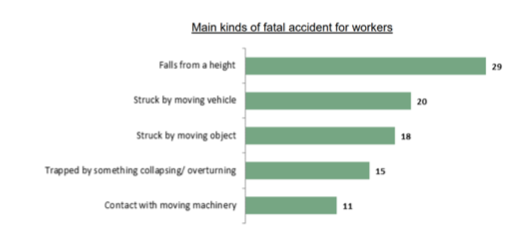Creating safe workplaces is more urgent than ever
Four years ago today, five workers were killed when an unsecured wall and 263 tonnes of metal collapsed on them while they were working at Shredmet metal recycling plant in Birmingham. This tragedy is thought to be the single biggest loss of life at such a workplace.
The criminal investigation and an inquest found that the risk of the tragedy was foreseeable, yet there has still been no arrest or prosecution over the deaths. The men, who were all from The Gambia and Senegal and were employed on zero-hours agency contracts, left behind families who have not yet received any compensation and instead are met with delays in their search for justice.
Monitoring numbers of deaths at work
The tragedy at Shredmet was not an isolated incident. Every year, working people die preventable deaths and the fight to make work safe is one trade unions and our allies continue to wage.
This week, the annual report on workplace fatal injuries was released by the Health and Safety Executive (HSE). This details the annual figures of workers who died as a result of injury sustained through work. It makes for devastating reading and a reminder of how important the role of union safety reps are in preventing injury and saving lives.
The figures, published by the Health and Safety Executive, report 111 deaths. But this is not the full picture. The statistics do not include fatal diseases (including Covid-19, which we know has led to a devastatingly high death toll this year), nor fatal transport accidents which do not occur on the railways (for example accidents at sea, in air or on roads). The report does suggest however, that the lockdown due to Covid-19 and the disruption caused to work in the preceding weeks, will have led to a lower rate of fatal injury at work during these months.
The Hazards Campaign-produced research ‘The Whole Story’ provides us a more accurate estimate of the number of people who die as a result of work-related illness or injury, and puts the annual figure at 50,000. These estimates, unlike the HSE’s stats, which are based on direct reports, include work-related cancers (for example cancer caused by asbestos), lung and heart diseases; as well as suicide linked to working conditions.
Despite not being a full picture, the HSE report does give us an understanding of the most dangerous sectors to work in, and who is most at risk, when it comes to fatal injuries.
Construction is still the most dangerous industry
Construction remains the industry with the highest number of fatalities, with 40 of those dying working in the sector. Industries with the highest death rates per 100,000 workers are the agriculture, forestry and fishing industry and recycling and waste industries, where the risk of fatal injury at work is 18 times higher than that of any other industry.


Insecure employment leads to more accidents
It is not a coincidence that the riskiest industries are also those where we find a larger concentration of workers on insecure contracts. Many are migrant workers, just like those from the Shredmet disaster. As with the Coronavirus pandemic, it those with the least power within our economic system that are the most at-risk. Short-term contracts make workers disposable in the eyes of bosses, and the hostile environment of our punitive immigration system puts migrant workers in further danger, as they work at risk and in fear of repercussions if they dare speak out or unionise.
Our safeguard against deaths at work is the ability to identify and mitigate risk and enforce safe working measures. When safety regulators have been gutted by cuts, and proactive inspections and investigations are in decline, it makes our fight that much harder.
Workers organising for safety via trade unions is an absolute necessity: we already know that workplaces with unions statistically have fewer accidents and deaths. Our 100,000 health and safety reps save lives every day, and while we fight for the living we remember those who have lost their lives, and organise in their memory.
Trade unions fight for safety at work because no life should be disposable, no work should be unsafe, and no boss should be able to avoid being brought to justice for thinking otherwise.
Stay Updated
Want to hear about our latest news and blogs?
Sign up now to get it straight to your inbox
